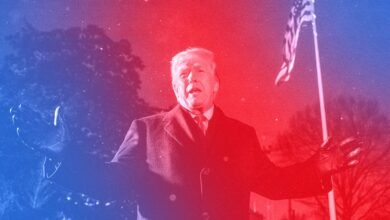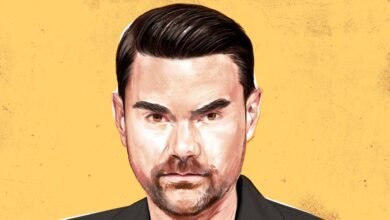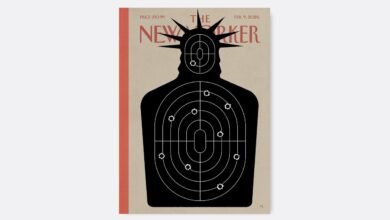
This was during the Suez War, you mean—when Britain and France and Israel launched an invasion of Egypt.
Yeah. No American President that I worked for, from Jimmy Carter to George W. Bush, ever created this kind of pressure. Trump basically said, “You do what I say. I’m the most pro-Israeli President in the history of the world. You do what I say. I’ve given you a document, which by and large is a very pro-Israel deal that does not envision a Palestinian state. It doesn’t satisfy your right wing, but I’m not really interested in them. Do it or else.” What we don’t know is what the “or else” was.
You are talking about what Trump said to Netanyahu in the Oval Office last week?
Exactly. Axios’s Barak Ravid and Marc Caputo reported that Trump basically said if Netanyahu didn’t agree to this, “We will walk away from you.” Biden had three pressure points he could draw from. He could have conditioned or restricted U.S. military assistance to Israel. He did not really do that. He could have introduced his own U.N. Security Council resolution critical of Israel, or voted for someone else’s and started to signal in international fora that he was not going to defend Israel. He didn’t do that. And he could have unilaterally reached out to the Palestinians, reversed his policies on economic assistance, and joined more than a hundred and forty other nations who recognize Palestinian statehood. He didn’t do that.
Trump, in my judgment, would not have done any of those things if Netanyahu had not agreed. But the compliance was based on Netanyahu’s fear that if he didn’t sign up, Trump would begin to wage a campaign saying that Netanyahu was mismanaging the U.S.-Israeli relationship—“undermining my interests and yours.” Netanyahu’s focus right now is on reëlection, probably in the spring of 2026. To win, he needs Trump. Trump is more popular in Israel than Netanyahu, and Netanyahu cannot break with him. And Israel is more dependent on the United States than ever, militarily and politically, so that relationship is more important. So, we don’t know what Trump actually threatened. My suspicion is he didn’t have to threaten anything. My suspicion is that Netanyahu understands who he’s dealing with.
So you are saying that this is a little different than it was in 1956, when the Eisenhower Administration effectively threatened the Israelis with sanctions and threatened the British government with collapsing the pound. Eisenhower and John Foster Dulles, his Secretary of State, were making real threats. You’re saying that Trump may not have actually threatened Netanyahu, but that there was a sense that Netanyahu needs Trump.
Right, there is no more mind meld, which had more or less been the case. Trump had basically acquiesced both tactically and strategically to Netanyahu’s policies in Gaza for the past nine months.
But it felt to me like both Bibi and Vladimir Putin were very smart about how they played Trump, which is that essentially they would let him criticize them occasionally or criticize Israeli or Russian policy. You saw Trump do this around starvation in Gaza. But both men fundamentally knew Trump was not going to keep at it and remain consistent.
Yeah, he was not focussed. He was inattentive.
So why not keep that strategy up now if you are Netanyahu?
Trump is more exposed, more invested, more identified with last Monday’s effort for peace than he was with the Anchorage summit, where he discussed Ukraine with Putin, or, frankly, the January ceasefire between Israel and Hamas. He’s the chairman of the board. This was a plan made in Washington, basically fashioned by Trump. Some adventurous journalists will at some point put together a TikTok on what Trump really knew about the Israeli strike on Qatar on September 9th, and when he knew it. [The Times reported that Trump learned about the strike “as it was happening.”] But I think Trump had actually already reached the conclusion that the war has to end, because he was frustrated with Netanyahu, and because he thought the public image of the war was so bad, and he thought he had to take a shot—not through a partial deal but through a comprehensive one.
One additional point: in the past nine months, Netanyahu had seen Trump do things that no American President, certainly none that I ever worked for, had ever done in and around Israel. He opened a direct dialogue with Hamas in March of this year. He cut a deal with the Houthis in Yemen, which the Israelis only learned about after the fact. Despite Israeli objections, he lifted sanctions on the new government in Syria. And he said that he wanted negotiations with Iran.
So even though Trump’s policies toward Israel itself were incredibly supportive, I think that Netanyahu was reading Trump correctly. We don’t know whether Trump threatened to use the three levers that Biden wouldn’t pull.
We also just don’t know enough about Trump’s relations with the Gulf states. You mentioned the Qatari plane deal—I don’t want to be naïve and pretend that these types of things, and others like them, won’t seem crucial when historians write about this in thirty years.
You’re saying Trump’s investment in the Gulf, basically?
I don’t know, but I don’t want to pretend that those things are not potentially important here.
Source link







